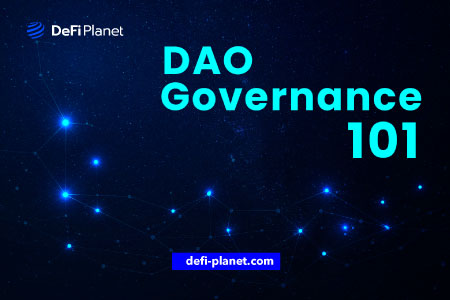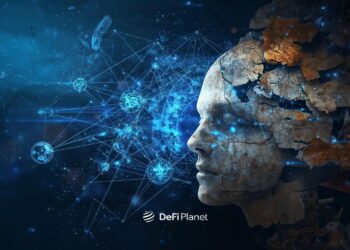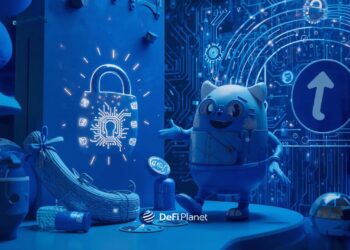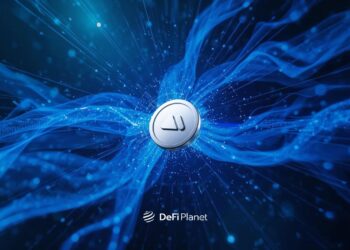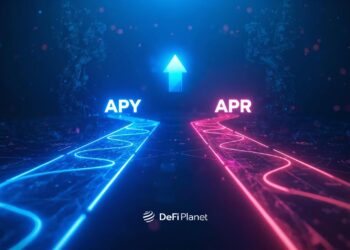It’s fascinating to see how several approaches to unlocking the full potential of blockchain technology have been inspired by the concept of decentralized autonomous organizations (DAOs).
Discussions about the DAO governance model have recently garnered a lot of interest due to the diversity of DAO implementations. The rapid rise of blockchain applications has also fueled much of the hype surrounding distributed ledger technology.
Blockchain, regarded as the “building block” of cryptocurrencies, has been used to create various innovative products. Through NFTs, DeFi, smart contracts, and dApps, blockchain has made it easier to move toward decentralization.
This article explores DAOs and how they function in decentralized governance. It also sheds light on the different types of DAO governance models.
What is DAO Governance?
Over ten years ago, Satoshi Nakamoto proposed a decentralized, peer-to-peer (P2P) system in the BTC whitepaper. Even though it was originally designed to be used for P2P payments, this technology now allows users to conduct business while keeping data private and secure.
The advent of blockchain technology has raised concerns regarding novel governance structures involving numerous parties. Decentralized Autonomous Companies (DACs), also known as decentralized autonomous organizations (DAOs), were first created in 2013. Shares in a DAC, whose rules are written in source code, are represented by cryptocurrencies.
DAOs, in theory, represent a company rather than a single application because they lack a conventional physical framework. The idea is that it can function completely autonomously, with human users having some control over how specific processes are carried out. DAOs are “owned” by the users, as opposed to conditional transactional programs, which are created and maintained by businesses with financial interests.
How Does DAO Governance Work?
Decentralized Autonomous Organizations are essentially computer-based entities that work autonomously, apart from voting. Users, not any private business or individual, are in charge of the DAO and can decide on its future course of action. DAOs are very different from the standard conditional transaction systems that businesses use to make money.
By studying how DAOs operate, one can gain a clear understanding of how DAO governance works. Smart contracts, which specify the guidelines and conditions for conducting transactions, serve as the foundation for the governance of decentralized autonomous organizations. The network’s blockchain would ensure transparent documentation of the DAO’s transactions and rules.
It is important to remember that DAO governance depends exclusively on the members who are in charge of making critical decisions about the project. Smart contracts assist in developing the DAO’s rule set through a core group of community members. Any member can learn how the protocol works at different times, and there will always be open proof, audits, and checks.
Benefits of DAO Governance
Current governance approaches are creating several opportunities for modern DAOs. One issue that deserves special attention is security because no user will put their money on an unstable network.
Governance models address these security issues by employing secure smart contract programming languages and adhering to higher programming standards. These languages are supported by modern token distribution techniques.
DAO Governance Models
Constitution DAO
The project was created by a core group of people who convinced many people to purchase copies of the United States Constitution. There was a lot of discussion on Discord throughout the week-long process, but nothing was voted on. The intention was to promote a governance model once the offer was accepted.
Although Constitution DAO was intended to become a DAO, it never did. They created $PEOPLE tokens that were supposed to eventually grant holders voting rights, but that didn’t happen—at least not until the group was disbanded.
Notably, the community decided to keep the remaining funds locked in the Juicebox smart contract after its dissolution as a reserve to support the remaining $PEOPLE tokens in circulation.
Ethereum Name Service DAO
The famous airdrop and delegate request launched the decentralized governance for the Ethereum Name Service (ENS) DAO. An ENS token is given for each registered Ethereum domain. This airdrop received a lot of social media attention because certain individuals received a large number of tokens.
Most proposals originate in the forum or on Discord. Later, they are put to the vote on Discord. The DAO’s constitution was the first proposition up for a vote. This constitution served as a check against the recommendations as well as a set of guidelines for the ideas.
This governance strategy is sluggish and complicated, though. A quorum of only 1% is needed to execute the proposals. This is a small number compared to the number of votes cast, implying that only a small number of delegates can move ideas forward.
The recommendations fall under four workstreams of the DAO:
- Governance discussions and meta-governance modifications, community-related proposals
- ENS adoption promotion
- Suggestions for building a thriving ENS ecosystem
- Suggestions for public welfare
Each group consists of five stewards. They carry out the following functions:
- Managing administrative tasks associated with the operation of a working group.
- Developing clear goals and a plan of action for the working group’s term, which should be published in the ENS governance forum within the first 30 days.
- Keeping a record of the working group’s focus and objectives.
- Obtaining funds from the DAO to support a working group.
- Endorsement and funding for workstreams, sub-groups, or contributors within a working group.
Friends With Benefits DAO
Friends With Benefits DAO consists of a group of Web3 enthusiasts and has elements of a decentralized social networking site.
Friends with Benefits employs the FWB governance token to facilitate user admission.
The FWB DAO’s governance mechanism was primarily based on consensus. It uses a multi-group governance model via Discord to disseminate proposals and the papers required to formalize the plans. Snapshot is also used to vote on various ideas in the FWB DAO governance model.
JuiceboxDAO
JuiceboxDAO is an open platform that allows projects to raise funds from the general public using the public smart contracts provided by Ethereum. This platform assists in the creation of a fundraising page, the development of a funding structure, the allocation of funds, and the distribution of tokens to members of the community.
Many DeFi enthusiasts are unable to complete the complex and time-consuming task of creating a treasury and distributing tokens to community members. JuiceboxDAO removes most of the complexity, making it easy for groups to set up and manage the fundraising process from start to finish.
Juicebox takes 5% of all funds raised for each project, so keep that in mind when making any trades. JuiceboxDAO then rewards efforts with the native Juicebox token, JBX, in exchange for the 5% fee. People who own a large number of JBX tokens greatly influence how JuiceboxDAO makes crucial decisions.
JuiceboxDAO divides jobs into various workstations. Each workspace functions as a collection of tasks with a similar focus. This is similar to the group split offered by other DAOs, except that workspaces, in this case, do not have governing authority over their duties or a limited voting scope. Its main goal is to divide tasks so that they can be executed successfully.
The Juicebox governance structure is centralized and moderately formal. This organization is distinguished by its voting process. The procedure is broken down into 14 cycles.
When a proposal is complete, it is posted on a Discord channel, where several community members will assist in workshop-style formatting.
Once there is a sufficient level of agreement on the suggestions for the Snapshot, the sponsors will submit the proposal for voting. Recommendations are implemented once they have been approved.
Protocol DAO
This is one of the most commonly used DAO options. It would use a DAO governance token as a voting indicator for making necessary changes and implementing the protocol. Some examples of Protocol DAO can be seen in Uniswap, Yearn, and Curve.
In Conclusion,
- In the absence of DAOs, thousands of decentralized projects may be considered proxies for decentralization.
- DAOs restore control to the people, as demonstrated by DAO governance.
- DAO governance allows users to vote on significant DAO proposals.
- DAOs are designed to meet multiple goals and use cases simultaneously.
- Since the system will evolve and could become complicated if a scalable system is not chosen, the governance model should be selected carefully, ensuring that it accurately matches a specific interest or business both now and in the future. It is crucial to search for a good DAO platform development business that can help choose the best DAO governance model and implement it from scratch up to execution.
If you would like to read more articles like this, visit DeFi Planet and follow us on Twitter, LinkedIn, Facebook, and Instagram.
“Take control of your crypto portfolio with MARKETS PRO, DeFi Planet’s suite of analytics tools.”

